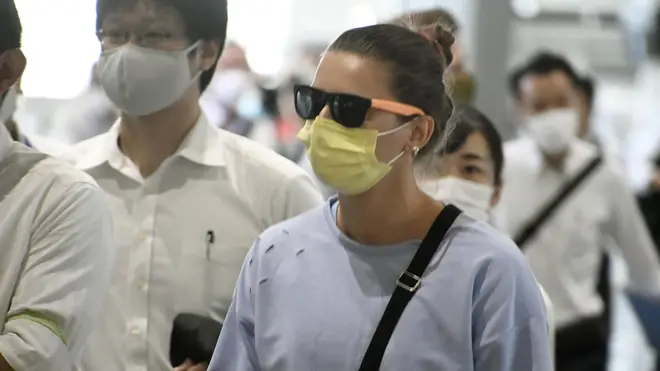
Shelagh Fogarty 1pm - 4pm
4 August 2021, 15:04

Vienna Airport said a direct flight carrying Krystsina Tsimanouskaya had arrived from Tokyo.
A plane carrying a Belarusian Olympic sprinter seeking refuge landed in Austria on Wednesday after she resisted an attempt by her Olympic team’s officials to send her home, where she feared reprisals from the authoritarian government.
Krystsina Tsimanouskaya boarded a plane at Tokyo’s Narita International Airport that left for Vienna, but she was expected to travel on to Poland, which has offered her a humanitarian visa.
Before leaving Japan, the 24-year-old Tsimanouskaya said she hoped she could continue her running career but that safety was her immediate priority.
Her husband fled the country quickly this week when he realised that his wife would not be returning to Belarus.
Vienna Airport said the direct flight that Tsimanouskaya boarded landed on Wednesday at 3.08pm local time.
Vadim Krivosheyev, an activist with the Belarusian Sport Solidarity Foundation, said Tsimanouskaya took the flight to Austria instead of Warsaw on the advice of Polish authorities.
“The decision to change the route and fly to Vienna was made by the Polish side for security reasons,” he told The Associated Press.

Tsimanouskaya was expected to head to Warsaw later Wednesday, according to Mr Krivosheyev.
Her experience at the Tokyo Games became an international issue after she accused Belarusian team officials of hustling her to the airport several days ago and trying to put her on a plane to Belarus because she had criticised the team’s management on social media.
The team officials said she would face reprisals back home, she said.
The officials “made it clear that, upon return home, I would definitely face some form of punishment,” Tsimanouskaya told the AP in a videocall from Tokyo on Tuesday.
“There were also thinly disguised hints that more would await me.”
She added that she believed she would be kicked off Belarus’ national team.

“I would very much like to continue my sporting career because I’m just 24, and I had plans for two more Olympics at least,” Tsimanouskaya said. But “for now, the only thing that concerns me is my safety.”
Reached by phone on Tuesday, Dzmitry Dauhalionak, the head of Belarus’ delegation at the Summer Olympics, declined comment, saying that he has “no words”.
Tsimanouskaya’s criticism of how officials were managing her team set off a massive backlash in state-run media in Belarus.
The runner said on Instagram that she was put in the 4x400m relay even though she has never raced in the event. She was then barred from competing in the 200m.
The sprinter called on international sports authorities on Tuesday “to investigate the situation, who gave the order, who actually took the decision that I can’t compete any more”. She suggested possible sanctions against the head coach.
In the AP interview, Tsimanouskaya also expressed worry for her parents, who remain in Belarus.
Her husband, Arseni Zdanevich, told the AP that he decided to leave the country when Tsimanouskaya told him she was not coming back.
Belarus was rocked by months of protests after President Alexander Lukashenko was awarded a sixth term in an August 2020 presidential election that the opposition and the West saw as rigged.
Authorities responded to demonstrations with a sweeping crackdown that saw more than 35,000 people arrested and thousands beaten by police.
In a show of determination to stifle dissent at any cost, Belarus authorities diverted a passenger plane that was flying from Greece to Lithuania in May and ordered it to land in the Belarusian capital, where they arrested an opposition journalist on board.
Amid Tsimanouskaya’s rift with team officials, two other Belarusian athletes announced their intention to stay abroad.

Heptathlete Yana Maksimava said she and her husband Andrei Krauchanka, who won silver in the decathlon at the 2008 Beijing Olympics, would remain in Germany.
“I’m not planning to return home after all the events that happened in Belarus,” Maksimava said on Instagram, adding that “you can lose not just your freedom but also your life” in her homeland.
The authoritarian Belarusian president, who led the Belarus National Olympic Committee for almost a quarter of a century before handing over the job to his older son in February, has shown a keen interest in sports, seeing it as a key element of national prestige.
Both Mr Lukashenko and his son were banned from the Tokyo Games by the International Olympic Committee, which investigated complaints from athletes that they faced intimidation during the crackdown on anti-government protests over the last year.
Western leaders have condemned Tsimanouskaya’s treatment by Belarusian authorities.
US secretary of state Antony Blinken denounced Belarusian officials’ attempt to force Tsimanouskaya to return to Belarus for exercising free speech as “another act of transnational repression”.
“Such actions violate the Olympic spirit, are an affront to basic rights, and cannot be tolerated,” Mr Blinken said on Twitter.